 We have the great pleasure of welcoming Paula Jarzabkowski, Professor of Strategic Management at University of Queensland, Australia and City St George’s, University of London, UK, to TripleEd. Paula’s bio below.
We have the great pleasure of welcoming Paula Jarzabkowski, Professor of Strategic Management at University of Queensland, Australia and City St George’s, University of London, UK, to TripleEd. Paula’s bio below.
As part of her visit Paula will participate in the Non-Extremis workshop on June 2. She will also give a talk on June 3. Everyone is most welcome to attend the talk on the 3rd! The talk is titled
“Building the canoe as we’re paddling it”:
A withness process lens on generating collective responsibility for a societal challenge
Authors: Paula Jarzabkowski, Tyler Riordan, Katie Meissner, Rosie Gallagher
Abstract
This paper takes a ‘withness’ approach to explain the process by which responsibilization for a societal challenge shifts from an individual to a collective approach. Our study is grounded in the societal challenge of making people’s housing more resilient to increasingly extreme weather. Our paper draws from a longitudinal real-time qualitative research study of the implementation of a resilient homes program following widespread catastrophic flooding. Our data set includes observations, sequential interviews, field trips, documents, and email exchanges across multiple stakeholders in the program. Working with program staff and other stakeholders in co-creating our research, our theorisation of the phenomena as a shift in responsibilization emerged alongside our understanding about ‘what this is a case of’. Specifically, without a template to follow, our participants had to work out how to bridge between what the program offered and the ability of homeowners to take it up. As we and our participants lived forward with this process, we all gained new understandings about variations in individual capabilities to assume responsibility to access the program. We conceptualized this process as a shift from a policy of individual responsibilization to an emerging collective responsibilization in response to variations in homeowner capability endowments.
Bio
Paula Jarzabkowski is Professor of Strategic Management at University of Queensland, Australia and City St George’s, University of London, UK. Paula’s research takes a qualitative, practice theory lens to understanding how people in organizations address the complex problems or ‘grand challenges’ affecting society. A Fellow of the Academy of Management, the Academy of the Social Sciences of Australia, and the British Academy, Paula publishes this work in leading journals and has also co-authored several books. Her current research is interdisciplinary, examining how societies are addressing the growing threat of extreme weather disaster. Paula is also passionate about impactful research, with her industry and policy expertise widely recognised in roles such as a member of the OECD High-Level Advisory Board for the Financial Management of Catastrophic Risks.


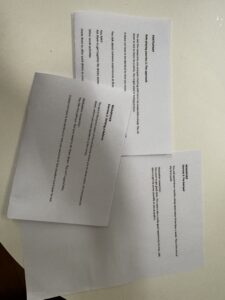 Over the course of the semester, we’ve mixed things up: from classic seminar discussions to deep dives into a few targeted questions, from writing exercises to walking tours around campus. Each session took on a different shape, reminding us that talking about research doesn’t have to follow a rigid format. Doing the same thing every time quickly becomes tedious. Academia deserves better than that — it can, and should, be a place full of creativity and energy. We just need to keep reminding ourselves of this and continue to experiment.
Over the course of the semester, we’ve mixed things up: from classic seminar discussions to deep dives into a few targeted questions, from writing exercises to walking tours around campus. Each session took on a different shape, reminding us that talking about research doesn’t have to follow a rigid format. Doing the same thing every time quickly becomes tedious. Academia deserves better than that — it can, and should, be a place full of creativity and energy. We just need to keep reminding ourselves of this and continue to experiment.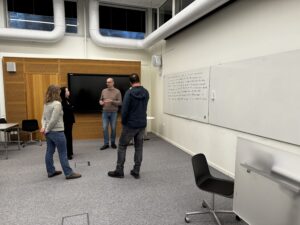
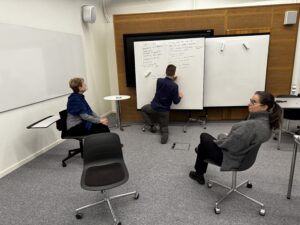
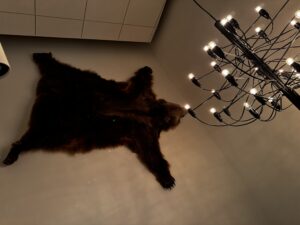 We’re officially in business: our very first “Secret Book Society” meeting for TripleED took place today! We got so swept up in lively discussion that we totally forgot to snap a group photo—oops. Luckily, the “Bear Room” mascot was on hand to capture the moment, so we’ll let our furry friend stand in for us this time.
We’re officially in business: our very first “Secret Book Society” meeting for TripleED took place today! We got so swept up in lively discussion that we totally forgot to snap a group photo—oops. Luckily, the “Bear Room” mascot was on hand to capture the moment, so we’ll let our furry friend stand in for us this time.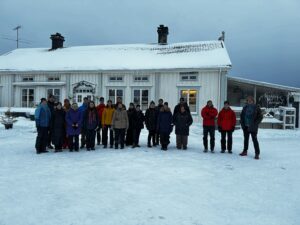
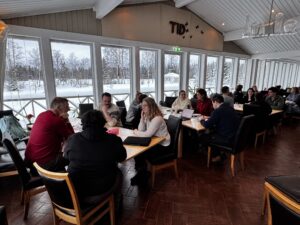 Thank you everyone that joined us for a few days in Umeå, for “In Extremis 2025”. It is truly something amazing that happens when you bring together curious, friendly and open scholars from different disciplines, methods and theories to discuss things dear to their heart – preferably close to a fire outdoors. Thank you everyone for taking the time to join us! Looking forward to the year to come and the future beyond that! Of course Piggy joined us, too!
Thank you everyone that joined us for a few days in Umeå, for “In Extremis 2025”. It is truly something amazing that happens when you bring together curious, friendly and open scholars from different disciplines, methods and theories to discuss things dear to their heart – preferably close to a fire outdoors. Thank you everyone for taking the time to join us! Looking forward to the year to come and the future beyond that! Of course Piggy joined us, too! 
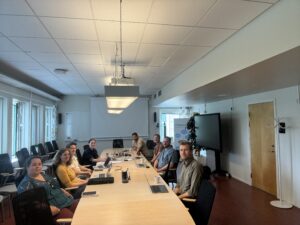 This Thursday, we had the pleasure of discussing another paper and trying to collectively make sense of the reviewer’s comments and how to respond to them. This was a great exercise in interpretation, offering learning opportunities for seniors as well as juniors.
This Thursday, we had the pleasure of discussing another paper and trying to collectively make sense of the reviewer’s comments and how to respond to them. This was a great exercise in interpretation, offering learning opportunities for seniors as well as juniors.